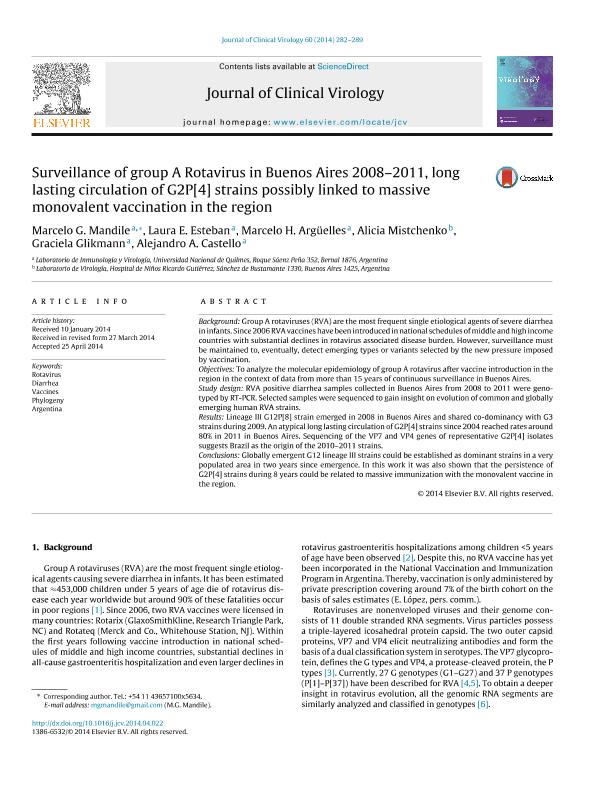Artículo
Surveillance of group A Rotavirus in Buenos Aires 2008-2011, long lasting circulation of G2P[4] strains possibly linked to massive monovalent vaccination in the region.
Mandile, Marcelo Gastón ; Esteban, Laura Emilia
; Esteban, Laura Emilia ; Argüelles, Marcelo Horacio
; Argüelles, Marcelo Horacio ; Mistchenko, Alicia Susana; Almallo de Glikmann, Graciela; Castello, Alejandro Andrés
; Mistchenko, Alicia Susana; Almallo de Glikmann, Graciela; Castello, Alejandro Andrés
 ; Esteban, Laura Emilia
; Esteban, Laura Emilia ; Argüelles, Marcelo Horacio
; Argüelles, Marcelo Horacio ; Mistchenko, Alicia Susana; Almallo de Glikmann, Graciela; Castello, Alejandro Andrés
; Mistchenko, Alicia Susana; Almallo de Glikmann, Graciela; Castello, Alejandro Andrés
Fecha de publicación:
07/2014
Editorial:
Elsevier Science
Revista:
Journal of Clinical Virology
ISSN:
1386-6532
Idioma:
Inglés
Tipo de recurso:
Artículo publicado
Clasificación temática:
Resumen
Background: Group A rotaviruses (RVA) are the most frequent single etiological agents of severe diarrhea in infants. Since 2006 RVA vaccines have been introduced in national schedules of middle and high income countries with substantial declines in rotavirus associated disease burden. However, surveillance must be maintained to, eventually, detect emerging types or variants selected by the new pressure imposed by vaccination. Objectives: To analyze the molecular epidemiology of group A rotavirus after vaccine introduction in the region in the context of data from more than 15 years of continuous surveillance in Buenos Aires. Study design: RVA positive diarrhea samples collected in Buenos Aires from 2008 to 2011 were genotyped by RT-PCR. Selected samples were sequenced to gain insight on evolution of common and globally emerging human RVA strains. Results: Lineage III G12P[8] strain emerged in 2008 in Buenos Aires and shared co-dominancy with G3 strains during 2009. An atypical long lasting circulation of G2P[4] strains since 2004 reached rates around 80% in 2011 in Buenos Aires. Sequencing of the VP7 and VP4 genes of representative G2P[4] isolates suggests Brazil as the origin of the 2010?2011 strains. Conclusions: Globally emergent G12 lineage III strains could be established as dominant strains in a very populated area in two years since emergence. In this work it was also shown that the persistence of G2P[4] strains during 8 years could be related to massive immunization with the monovalent vaccine in the region.
Palabras clave:
Rotavirus
,
Diarrhea
,
Vaccines
,
Phylogeny
Archivos asociados
Licencia
Identificadores
Colecciones
Articulos(SEDE CENTRAL)
Articulos de SEDE CENTRAL
Articulos de SEDE CENTRAL
Citación
Mandile, Marcelo Gastón; Esteban, Laura Emilia; Argüelles, Marcelo Horacio; Mistchenko, Alicia Susana; Almallo de Glikmann, Graciela; et al.; Surveillance of group A Rotavirus in Buenos Aires 2008-2011, long lasting circulation of G2P[4] strains possibly linked to massive monovalent vaccination in the region.; Elsevier Science; Journal of Clinical Virology; 60; 3; 7-2014; 282-289
Compartir
Altmétricas



